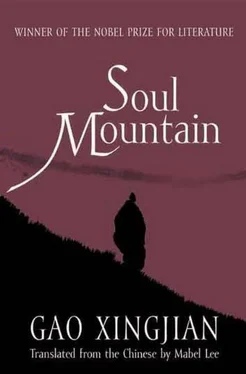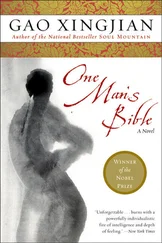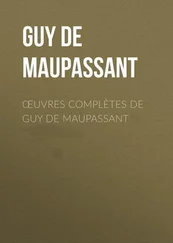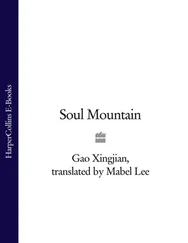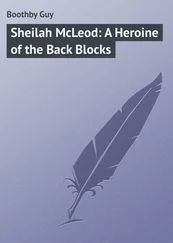“This is the kingdom of the Qichun snake,” he says.
I think it’s thanks to the Qichun snakes that this stretch of primeval subtropical forest and undergrowth of evergreen broadleafs has been preserved.
He was first in the army and then a cadre. He has travelled to many places but he says he doesn’t want to go anywhere now. Not long ago he turned down an appointment as sub-station chief in the Public Security Bureau and also refused to head the botanical farm unit of the reserve. He just watches over the mountain on his own and has been captivated by the mountain.
He said five years ago tigers used to come to the village settlement and take off cattle but these days no-one sees any signs of tigers. Last year when the peasants killed a leopard, he confiscated it and had it sent to the reserve administrative office in the county town. The skeleton was first treated with arsenic before being made into a specimen and locked in the specimen room, but still it was stolen. Someone had climbed up the water pipe and got in through the window. If the arsenic-treated bones are passed off as tiger bone and sold for soaking in spirits, then drinking it will really bring about longevity.
He says he’s not an ecology protection agitator and he can’t do research, he’s just a ranger. When they built this ranger station on the reserve, he decided to stay. There are several upstairs rooms in the building and he can offer hospitality to specialists and scholars to facilitate their investigations and collecting of specimens.
“Don’t you get lonely being on the mountain all year round?” I ask, seeing that he doesn’t have a wife or children.
“Women are troublesome.”
He then started talking about when he was a soldier. During the Cultural Revolution women also joined in causing havoc. There was this nineteen-year-old girl who had civilian militia training and was one of the top-ranking shooters of the province. During the armed battles, she went with her group up the mountain and, one shot at a time, picked off five soldiers in the company which had surrounded them. The company commander was angry and gave orders to take her alive. Afterwards when she ran out of ammunition, she was caught, stripped, and a soldier fired a magazine of bullets from his submachine gun into her vagina. He also spent some time in a small mine as a personnel cadre. When the miners fought over a woman the knives would go in clean and come out red, and this was on top of the more ordinary complications over women. He had a wife once but they separated and he doesn’t intend to get married again.
“You can stay here and write your books, it’s good having someone to drink with. I drink every meal, not a lot, but always some.”
A peasant carrying a string of small fish is crossing the single-log bridge over the bend of the river in front of the house. The chief ranger calls out to him, says he’s got a guest and gets him to bring them over.
“I’ll make you sesame and chilli fish, it’s just the thing to go with liquor.”
He says if he wants fresh meat he can get the peasants to get it for him when they go to the markets. And twenty li from here, in the settlement, there’s also now a little shop where you can even buy liquor and cigarettes. And he regularly gets to eat bean curd because whenever the peasants make it he always gets a portion. He keeps a few chickens so chicken and eggs are never a problem.
At noon, beneath the dark green mountain he and I drink liquor and feast on sesame and chilli fish and a bowl of salted meat which he has steamed.
“You are really living the life of an immortal,” I say.
“I don’t know about it being an immortal’s life but it’s peaceful and I’m not troubled by many anxieties. My work is simple, there’s only the one path up the mountain, it’s right under my eyes, and I have only to fulfil my duty of keeping watch over this mountain.”
Coming through the county town I’d heard that his mountain was the best managed in Heiwan River district. It seems to me this is due to his philosophy of not seeking fame and wealth. In his view it is because he gets on really well with the peasants here. Every New Year an old peasant will always bring him a bag of dried roots as a gift.
“When you go into the mountains, if you’re chewing a piece of this root the snakes will keep away from you.” Saying this he goes into his room and brings out a straw bag, opens it, and gives me a brown root. I ask what plant it is but he says he doesn’t know and he doesn’t ask. It’s the mountain people’s secret remedy handed down from their ancestors and they have their rules about it.
He says a round trip to Gold Top, on the main peak, will take three days. I’ll have to take rice, oil, salt, as well as some bean curd, green vegetables and eggs. On the mountain, I’ll have to spend the night in a cave. The cotton-wadding beds used by scientific researchers earlier on are still there, they’ll keep out the cold. It’s windy up there, and it’s very cold. He says he’ll go to the village to have a look, and if he finds someone I’ll be able to go today. He heads off in the direction of the single-log bridge.
Afterwards I go for a walk around the bend of the river. In the shallows the river flows fast and sparkles in the sunlight like crystal, but in shady spots it is dark and there seems to be something menacing about it. There is a thick growth of forest and undergrowth on the banks, so thick that it looks black: it has a frightening dark dampness and must be alive with snakes. I cross the single-log bridge and come to the other side. Behind the forest is a small village settlement of five or six families. There are tall, old wooden buildings with walls and rafters which have gone black, probably because of the over-abundant rain here.
The village is quiet and lonely, devoid of human sounds. The doors are all open and the uncovered rafters are crammed with dry grass, farm tools, wood and bamboo. I almost go in to have a look but suddenly a grey-black mixed-breed Alsatian appears, growling ferociously and coming right at me. I quickly beat a retreat and go straight back over the single-log bridge. Before me is the huge black-grey form of the mountain in the sunlight behind the small ranger station.
Jolly laughter comes from behind and looking around I see a woman coming across the single-log bridge. She is toying with a carrying pole in her hands on which is curled a big five- or six-foot snake with a length of wriggling tail. She is obviously calling me and I go up to the edge of the river before I can make out what she is asking me.
“Hey, want to buy a snake?” Quite unperturbed, she giggles as she comes toward me, one hand holding down seven inches of the snake and the other holding the pole with the writhing serpent coiled around it.
Luckily the ranger appears just in time, and from the other side of the river, scolds her, “Go back! Do you hear? Go back right away!”
The woman has to go back to the other side of the bridge as instructed.
“She’s crazy, this woman, as soon as she sees a stranger she always wants to get up to some sort of mischief,” he says. He tells me he’s found a peasant to act as a porter and guide. He’ll fix up a few things in his office and then arrange a few days provisions for me. I can go ahead as far as I like, the guide will follow after, the mountain people are used to travelling on these mountain paths and he’ll catch up right away with a basket on a carrying pole. There’s only the one path up the mountain so you can’t go wrong. Seven or eight li up is a copper mine which earlier on was half developed before it fell into disuse, if he doesn’t turn up by then I can stop there for a while.
He tells me to leave my backpack, the peasant can bring it for me. He also gives me a stick, saying it will help conserve energy going up the mountain and can be used for chasing off snakes. And he tells me to chew a piece of the dried root he gave me. I bid him farewell. He waves to me, turns, and goes inside.
Читать дальше
Конец ознакомительного отрывка
Купить книгу
